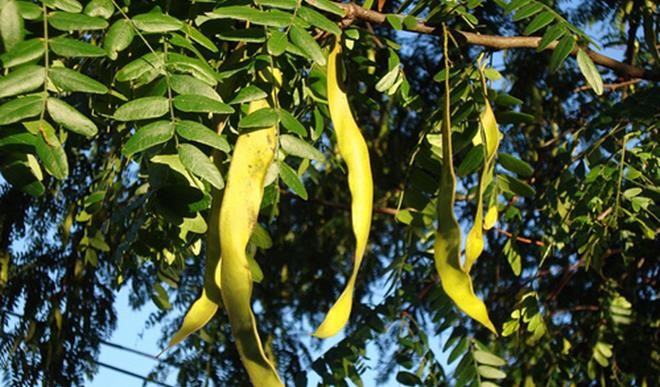
Botanical name: Parkia Biglobosa
Common names: West African locust bean tree, monkey cutlass tree
Local names: Dorawa (Hausa), Ogiri (Igbo), Ini (Yoruba) and Runo (Kanuri)
Description/ Distribution
A perennial deciduous tree mainly found in Africa, which grows between 7-20 metres high or more with thick dark greyish-brown bark. Found from Atlantic coast in Senegal to Southern Sudan and Uganda. It is as well found in Natural communities where cultivation is Semi-permanent. Contribute in trade of Local and regional level of West Africa. The tree has pods known as locust bean, which is pink in the beginning to dark brown. Nigeria is estimated to produce about 200,000 tons per year. Each pod contains about 30 seeds. It is found in Savannah region (West and East Africa).
Parts used: Leaves, bark, fruit, pulp, seeds.
Constituents
Alkaloids, cyanogenic glycosides, saponins, tannins. The seeds contain proteins, lipids, vitamin B2, lysine, calcium, sodium, and potassium. The pulp contains high energy, 29% protein, 60% saccharine, vitamin C and phosphorus.
Medicinal/Health Benefits
• Seeds are used in making the popular seasonings (dawadawa)
• Decoction of the bark is used in treating wounds and for burns.
• It is used in the combination with other herbs in treating malaria
• Leaves and pods are used as an antidiarrheal agent
• Decoction of the barks is used in treating high blood pressure
• Ever green leaves are used in managing intestinal disorders as an astringent
• The seed is used as a substitute for coffee
• Used as energy food source during famine or draught.
• Also used in managing intestinal disorders, obesity, antitumor, and as carminative.
• Maceration of stem bark is taken for ulcers, asthma, diarrhea, sterility and hypertension.
• Vapors from the leaf decoction is inhaled for palpitation.
• Roasted seeds (Sudan coffee) as aphrodisiac.
• Mouthwash made from bark is used for toothache.
• Pounded leaves with some lemon juice is applied to wounds, sores, ulcers as dressing.
• For jaundice, leaf decoction is drunk and used for washing.
Health Tips
• 1 tablespoonful of pulp + 1 tablespoonful of baobab in a glass of water serves as a refreshing drink and tonic.
• 2 tablespoonfuls of pulp in a glass of water serve as a carminative and laxative.
• 2 tablespoonfuls of powdered bark + ½ glass of lemon juice + 1-2 tablespoonfuls of boiled water or dilute spirit or vinegar.
• Chew the bark for virility and for aphrodisiac effect.
• Roasted seeds, 1-2 tablespoonfuls of crushed seeds to 1 teacup of boiled water as an infusion to replace coffee with much nutritive benefit. Suitable for hypertensive and diabetic effect.
• 1 tablespoonful of powdered pulp in a cup of pap is useful for convalescence period given to step up the recovery period after an illness.
• Also suitable for malnourished children.
Economic benefit
Used in making timber, furniture, mortar and pestle.

 Join Daily Trust WhatsApp Community For Quick Access To News and Happenings Around You.
Join Daily Trust WhatsApp Community For Quick Access To News and Happenings Around You.


